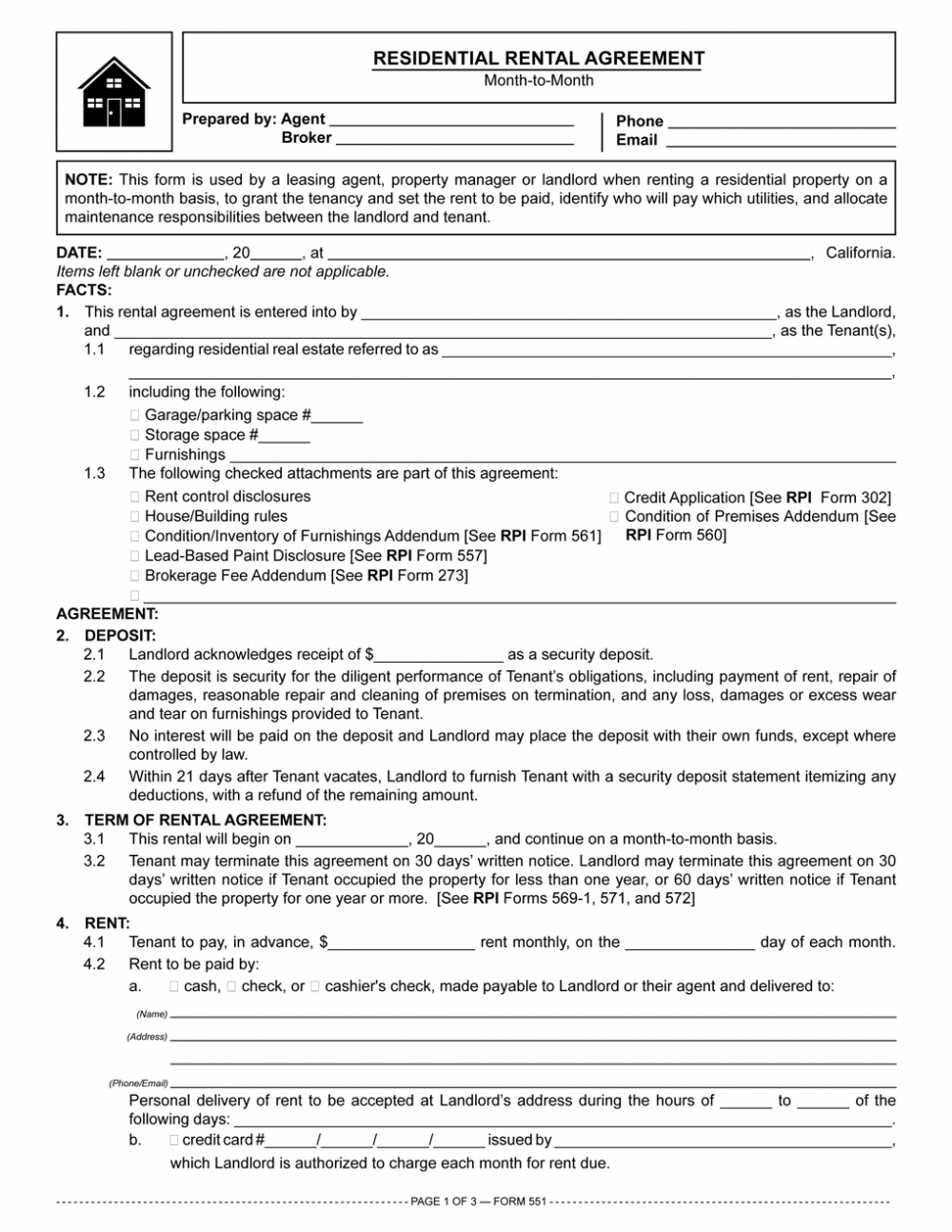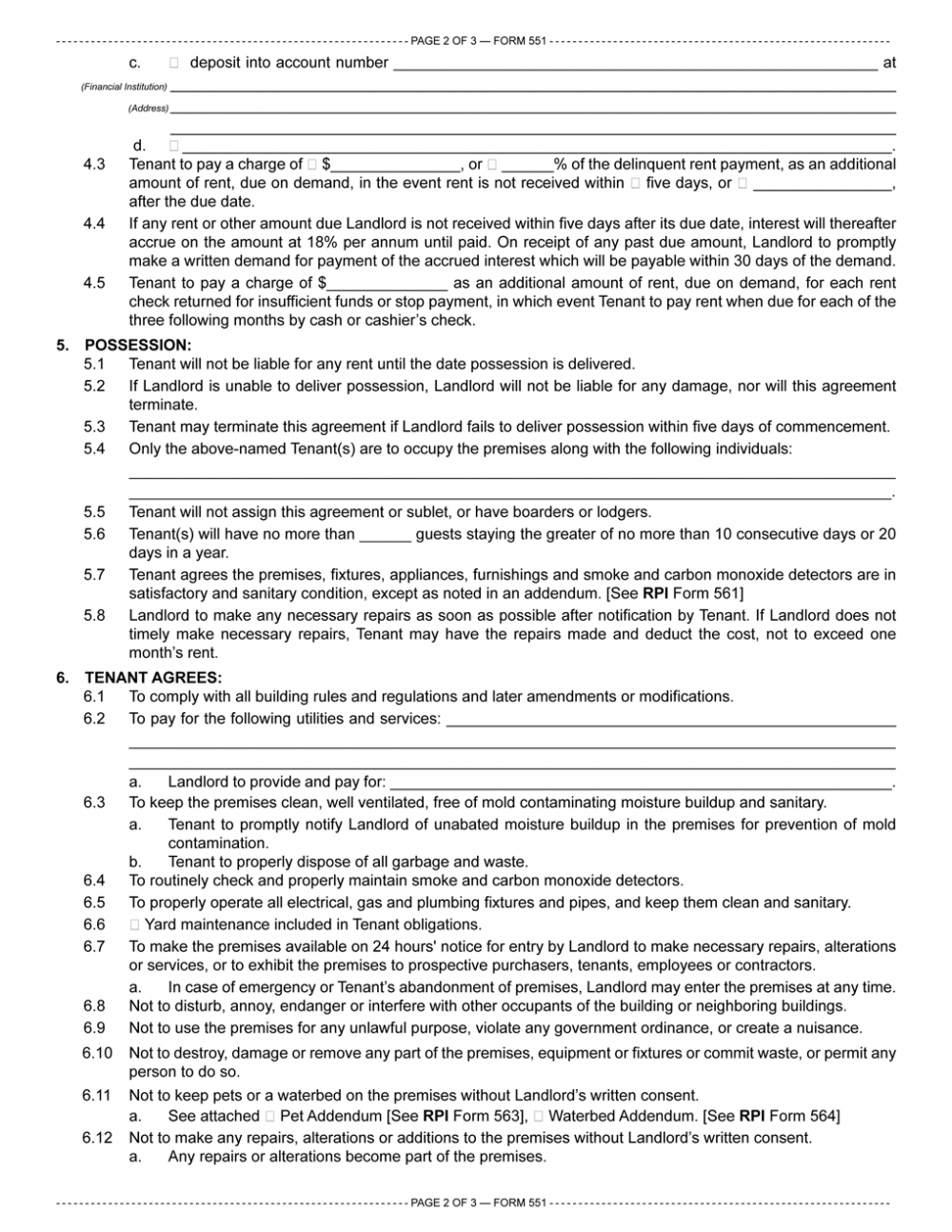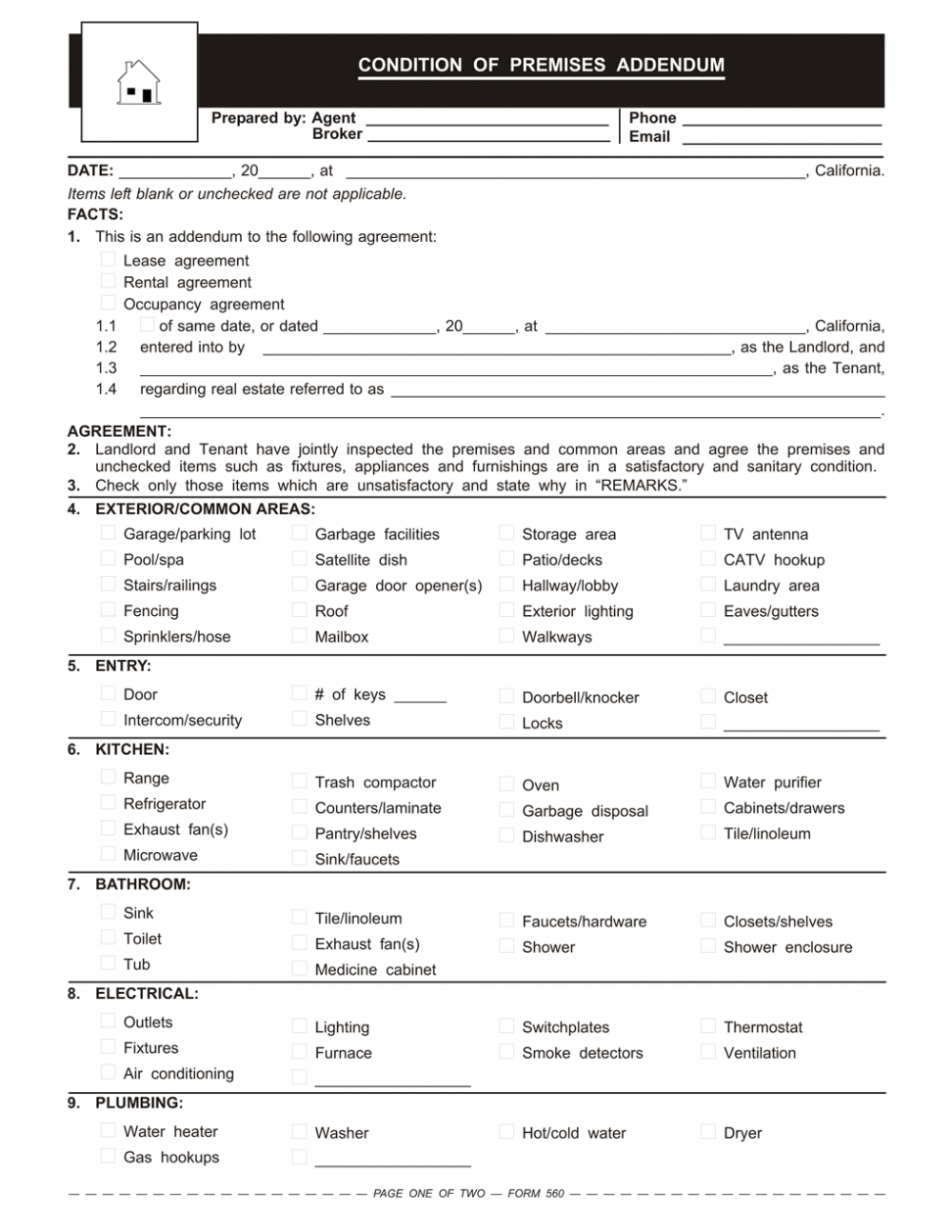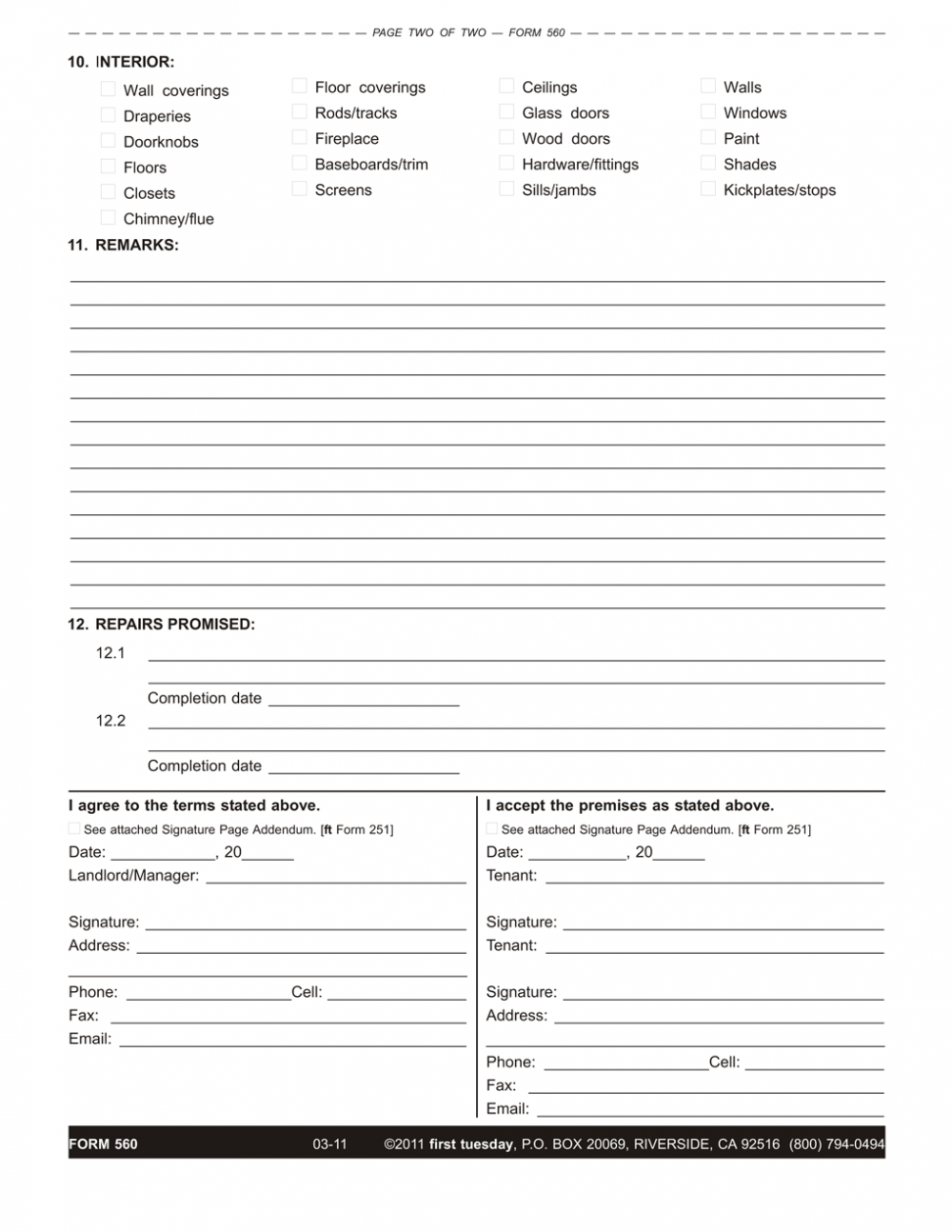Form-of-the-week:
Residential Rental Agreement and Condition of Premises Addendum – Form 551 and 560
Periodic and fixed-term tenancies distinguished
Residential landlords and tenants either enter into a:
- periodic rental agreement; or
- fixed-term lease agreement.
Residential periodic tenancies are documented in the form of month-to-month rental agreements. [See RPI Form 551]
Alternatively, when leasing a residential property on a fixed rental-rate basis for a specific period of time, the document used is a lease agreement. [See RPI Form 550]
Both residential rental and lease agreements grant and impose the same basic rights and obligations on landlords and tenants. Their difference lies in the expectation of continued occupancy and the obligation to pay future rent.
A month-to-month rental agreement runs for an indefinite period of time. The tenant’s right to occupy the property on the same terms automatically renews monthly, until modified by the landlord or terminated by either the tenant or the landlord. [See RPI Form 551 §3]
Periodic tenancies may be terminated by either the landlord or tenant on 30 days’ written notice. As an exception, when a residential tenant’s occupancy of a unit exceeds one year, the landlord needs to serve the tenant with at least 60 days’ written notice. [Calif. Civil Code §1946; see RPI Form 569 and 569-1]
On the other hand, a lease agreement creates a tenancy that continues for a finite period of time. At the end of a fixed-term tenancy, the tenant’s right of possession automatically expires as agreed in the lease and without further notice. The termination of the tenancy is set by the expiration date in the lease agreement. [See RPI Form 550 §3]
The Residential Rental Agreement published by RPI (Realty Publications, Inc.) is used by a leasing agent, property manager or landlord when renting a residential property on a month-to-month basis, to grant the tenancy and set the rent to be paid, identify who will pay which utilities, and allocate maintenance responsibilities between the landlord and tenant. [See RPI Form 551]
Conditions imposed on a residential occupancy
Residential tenants typically provide a security deposit to the landlord to cover any cost to clean the unit or remedy any damage caused to the unit beyond reasonable wear and tear when the tenant vacates the property. [See RPI Form 551 §2.1]
Further, in return for the use and possession of the premises, the tenant pays the landlord rent for the duration of their tenancy. The tenant also agrees to pay a late charge when rent is not received by the landlord by the due date, or within the established grace period. [See RPI Form 551 §4]
Also, a list of occupants who will reside in the property in addition to the named tenants is provided in the rental agreement. Occupants are treated differently than guests who are short-term visitors. The number of guests the tenant may have in their unit, and the number of days their guests may stay overnight, is limited. [See RPI Form 551 §§5.4 and 5.6]
The tenant agrees to comply with all building or project rules and regulations established by any existing covenants, conditions and restrictions (CC&Rs) or the landlord. [See RPI Form 551 §6.1]
The landlord and tenant further agree how they will share the financial responsibility for payment of the unit’s utilities. [See RPI Form 551 §6.2]
Editor’s note — Landlords of apartment buildings or complexes often retain the responsibility of providing water to the units.
The tenant also agrees to hold the landlord harmless from all liability for damages caused by the tenant or their guests. To cover this tenant liability exposure, the tenant is often required to provide insurance coverage. [See RPI Form 551 §7.1]
Existing statutory rights and duties restated
Residential rental and lease agreements often contain provisions that restate the landlord’s and tenant’s statutory rights and duties which are not well understood. RPI’s Residential Rental Agreement reiterates the landlord’s statutory obligation to furnish a tenant with:
- a security deposit refund;
- a notice of the tenant’s right to a joint pre-expiration inspection of the unit and delivery of an itemized statement of repairs and needed cleaning [CC §1950.5(f)]; and
- a statement of security deposit accounting and an itemization of any deductions. [CC §1950.5(g)(1); see RPI Form 551 §2.4]
Further, the rental agreement advises tenants of their limited statutory right to make necessary repairs to the premises and deduct the cost from the rent when the landlord fails to make the repairs the tenant has brought to the landlord’s attention. [CC §1942; see RPI Form 551 §5.8]
The rental agreement prohibits a tenant from:
These are statutory prohibitions. When a rental agreement does not restate them and a tenant conducts any of these prohibited activities, the landlord may evict them by the service of a three-day written notice to quit. Here, no alternative performance is available to the tenant permitting them to cure the defect and stay. [Calif. Code of Civil Procedures §1161(4); see RPI Form 575 and 575-1]
Reasonable deductions from the deposit
Reasonable deductions from a residential tenant’s security deposit include:
- any unpaid rent, including late charges and bounced check charges incurred and requested on a proper demand;
- recoverable costs incurred by the landlord for the repair of damages caused by the tenant;
- cleaning costs to return the premises to the level of cleanliness as existed when the property was initially leased to the tenant, less reasonable wear and tear; and
- costs to replace or restore furnishings provided by the landlord if agreed to in the lease. [CC §§1950.5(b), 1950.7(c)]
The landlord may not deduct from a tenant’s security deposit the costs the landlord incurs to repair defects in the premises which existed prior to the tenant’s occupancy. To best avoid claims of pre-existing defects, the landlord and the tenant conduct a joint inspection of the unit and document any defects in writing before the landlord gives possession to the tenant. [CC §1950.5(e); see RPI Form 560]
Condition of premises addendum
A residential landlord has the statutory duty to maintain the rented premises in a habitable condition at all times. Similarly, a tenant has the statutory duty to refrain from damaging the premises and advise the landlord of adverse conditions which come about during the tenancy. [CC §§1941, 1941.2]
To avoid disputes over who is responsible for any damage to the premises, the residential landlord and tenant complete and sign a Condition of Premises Addendum before the tenant is given possession. [See RPI Form 560]
The Condition of Premises Addendum published by RPI is used by a property manager or landlord when conducting a pre-occupancy inspection with a residential tenant who enters into a rental or lease agreement, to document the condition of the premises and state the landlord’s obligation to make any promised repairs. [See RPI Form 560]
Before a tenant takes possession, the landlord or their manager needs to conduct a walk-through of the unit with the tenant. Together, the landlord (or property manager) and the tenant will use the Condition of Premises Addendum to note:
- whether the premises is in satisfactory condition;
- any existing damage to the premises; and
- any repairs the landlord is to make to the premises before the tenant takes possession. [See RPI Form 560]
Similarly, when the unit is furnished, the landlord and tenant complete and sign an additional form on their pre-occupancy walk-through called a Condition of Furnishings Addendum. The Condition of Furnishings Addendum notes:
- the inventory of furnishings located in the unit;
- the current condition of the furnishings; and
- the tenant’s acceptance of the furnishings. [See RPI Form 561]
Within 30 days before the end of a residential tenancy, the Condition of Premises Addendum is reviewed during the pre-expiration inspection to help establish tenant responsibility for excess wear and tear to the unit rented.


























The users whose opinions dissent from those of the Kremlin are obstructed though they do not break any territory rulesLately something totally unthinkable is feat on in the Country portion of the Facebook wrote another individual.